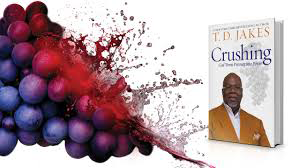 In this session of Crushing by TD Jakes, we continue into chapter 10; Out of the Tomb and into the Bottle.
In this session of Crushing by TD Jakes, we continue into chapter 10; Out of the Tomb and into the Bottle.
As Pastor Jakes used the event of his wife’s physical condition, we too and reflect on numerous times in our life that brought us to a point of decision and how the pain was on the front side, there was also recovery pain on the back side. This parallels the way we begin shifting our energies as we realize our crushing is now resulting in fermentation. We begin to glimpse what God is up to. We see a way forward. We feel the first sparks of hope flint from our faith forecast of the future.
Can you share about a time when your own body caused physical limitations. How did you manage the pain involved? And how was the pain of recovery different?
When Jesus arose from the tomb, He left its vacancy as a relic of His resurrection. The women who ventured out that early morning found only a massive stone beside the gapping cavern of the burial chamber. Inside, they found only the crumpled burial shroud. Strangely enough, however, it was not the empty tomb that became the major symbol of Jesus’ followers in the early church. Instead, they eventually chose the instrument of their Savior’s death, the cross. In many ways, this was an odd and chilling reminder, because the cross was well known as the common way to execute criminals in one of the most painful ways possible. In Jesus’ time, the cross carried the same kinds of connotations we might associate with lethal injection, the electric chair or gas chamber.
While we now use the cross as a symbol of worship and recognize its eternal significance, we must be careful not to lose sight of its original impact. The crushing power of the cross was both physical as well as spiritual. We now celebrate the cross only because Jesus was not defeated by it. As a result, the cross reminds us of God’s life-giving, death-defying power to bring His eternal wine out of our momentary pain.
What is your immediate reaction when you see a cross in our culture today? Does it make a difference whether you see a ross on a church or around the neck of a young teen on the street or maybe even on a personality on television?
What does the cross mean to you at this point in your life? in what ways has it become too familiar and lost its meaning? how do you keep it personally relevant?
For a month, Jesus revealed Himself among His followers in various times, places and points of contact, making sure that those who loved Him realized that the crushing devastation they shared when He was killed was now overshadowed by the joy of His return. Christ wanted them to witness that the painful process had purpose, one greater than even alleviating their grief and heartache.
Our Savior not only conquered death for our salvation, but He also returned to bring resurrection power through the Holy Spirit to us collectively, as His body, His bride, the fellowship of believers known as the church. Many church historians and theologians considered Pentecost, when believers gathered for prayer and worship and received the gift of the Holy Spirit, the pivot point for the birth of the church. Without the crushing of the cross, we would not know the resurrection power of Pentecost.
Whey do we think Jesus went out of HIs way to show Himself to His followers in so many different times and places after His resurrection?
Let’s read Acts 2 together;
What strikes you most about this dynamic event? How does this story resonate in your life today?
Anyone who perseveres and succeeds in fulfilling their life’s purpose has almost certainly endured the dark, shameful, excruciating path of crushing. They failed, they suffered, they experienced death — then then, through God’s power and their willingness to rise and remove the shroud of their past, they too began to come to life again. They begin to realize that they are different people, stronger and better and more capable of seeing what is true about who they are and why they are on this earth.
We are no different. As followers of Jesus, we share in the tearful trail of Calvary, carry the personalized crosses that threaten to kill us. But then we, too, experience Christ’s resurrection power coursing through us. We sense the potent fermenting taking place in the remains of who we once were before our crushing. We begin to realize that there is new life on the other side of of the old, pre-crushing life we used to know.
The cross of our shame felt like it would kill us. Every failed relationship, scandal, bankruptcy, conviction, resignation, and bad decision felt like death. But now we know the hope that comes from the eternal life we have in Jesus Christ. Like the apostle Paul, we know that it is this hope that makes us no longer ashamed (Romans 5:5) Hope promises us that what we thought would kill us only made us stronger.
What are some things in your life that reminds you of how far you have come in your faith? How is that meaningful for you today?
Do you agree that hope is the antidote for shame? Why or why not?
Throughout or lives, we all have our crosses to bear: past abuse, a chronic illness, unrelenting debt, the trauma of unexpected loss. We all go through such times of crushing, but we must never forget our crushing is not the end. From the vineyard where our fruit is crushed into juice we go to the vat of fermentation, the vat of victory. Once we have fermented, then we begin to realize that there is more ahead.
Our new wine must now be contained in new configurations. We are not who we used to be and not yet fully who we will one day become. Just as wine must be funneled from the vats into bottles in order to be stored, shipped, purchased, and enjoyed, we also find ourselves poured into new containers. After our crushing we may find it’s time to start a new relationship, a new joy, a new lifestyle, a new ministry.
In order to move forward, however, we must realize that we cannot go back. Things will never be as they once were before our crushing. Jesus said…
“No one puts a piece of unshrunk cloth on an old garment; for the patch pulls away from the garment, and the tear is made worse. Nor do they put new wine into old wineskins, or else the wineskins break, the wine is spilled, and the wineskins are ruined. But they put new wine into new wineskins, and both are preserved.” – Matthew 9:16-17 NKJV
Our pain has now been fermented into new wine. We will never change the past. We cannot undo what has been done or reclaim all that has been lost. Instead we have something new to offer, something with much more power, richer and more delicious in flavor. No longer can we live as crushed fruit because now we are God’s new wine ready to be tasted and served.
What remnants of old wineskins do you need to relinquish in order to make room for the new wine you’re becoming? What has caused you to resist giving them up prior to now?
What does it mean for you to see yourself as God’s new wine? Or in other words, how can you see yourself differently in light of the crushing you have endured?
During this season in your life, acknowledge where you are at in the current season. You might be in the midst of a harvest and many things see positive and optimistic. Others of us might be in the midst of crushing, being transformed. Others yet are in a fermenting stage and anticipating what is in store ahead. Or we might be in the uncomfortable situation where new changes are happening and we are not used to or at ease with the new life being defined.
What ever our situation, let us realize that it is a process and not a one time event. In this week to come, let us realize that everyone we come in contact with has their own process in motion. Be aware, be sensitive, be encouraging, by more like Jesus…
Jakes, T. D. Crushing: God Turns Pressure into Power. FaithWords, 2019.
